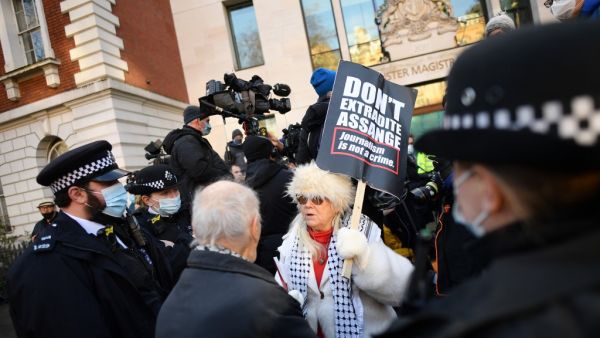Julian Assange today lost his bid to become a free man after almost 10 years of prison and self-imposed confinement as he was denied bail by a judge.
The WikiLeaks founder dramatically won his legal fight against a US attempt to extradite him on Monday, and at a hearing this morning his lawyers argued he should be freed from HMP Belmarsh and held under house arrest.
Breaking: A London Judge has denied a bail application for Julian Assange #assangecase
— WikiLeaks (@wikileaks) January 6, 2021
But he was refused bail from the high-security prison due to the risk he could try to flee while US officials put together a fresh legal challenge.
Assange's lawyers had argued he had 'every reason' to remain in the UK now the threat of extradition to the US had been removed, and claimed Belmarsh was unsafe due to a Covid outbreak.
But US Government attorney Clair Dobbin told the court there were no conditions that would guarantee Assange would surrender to bail.
'He is someone who has shown himself as capable of going to extraordinary lengths to avoid extradition,' she said.
The lawyer said the court should be under no illusions of the willingness of other states to help Assange, citing the president of Mexico offering him asylum during a briefing.
She said Assange was capable of going to 'almost any lengths' to avoid being sent to the US, to the point of spending seven years living in the Ecuador embassy in London.
Stella Moris - with whom Assange shares two young sons after they fell in love while she was his lawyer - attended today's hearing but has not yet given her reaction.
On Monday, US officials were left 'extremely disappointed' after Judge Vanessa Baraitser ruled he could not be sent to the US to face spying charges due to the risk of him taking his own life in the notorious 'Supermax' jail where Abu Hamza is held.
Stella Moris - with whom Assange shares two young sons after they fell in love while she was his lawyer - hailed the Judge Baraitser's decision, saying: 'Today is a victory for Julian. Today's victory is a first step towards justice in this case.'
She also issued a direct appeal to Donald Trump, which references President Ronald Reagan's 1987 appeal to Soviet lead Mikhail Gorbachev to 'tear down' the Berlin Wall.
'Mr President tear down these prison walls,' she said. 'Let our little boys have their father. Free Julian. Free the press.'
JUST IN: WikiLeaks founder Julian Assange is denied bail, pending a US appeal to a ruling that blocked his extradition from the UK. https://t.co/WSuyNyDgpa
— CNN (@CNN) January 6, 2021
On Monday, Judge Baraitser said there was an 'unmanageable high risk' of Assange taking his own life if he was housed amid the grim conditions as she revealed he has autism, Asperger's and a severe depressive disorder.
She accepted the evidence of medical experts who revealed that Assange had spoken openly about suicide while in Belmarsh and had prepared for it by writing a will. A razor blade was also found in his cell.
She also issued a direct appeal to Donald Trump, which references President Ronald Reagan's 1987 appeal to Soviet lead Mikhail Gorbachev to 'tear down' the Berlin Wall.
'Mr President tear down these prison walls,' she said. 'Let our little boys have their father. Free Julian. Free the press.'
On Monday, Judge Baraitser said there was an 'unmanageable high risk' of Assange taking his own life if he was housed amid the grim conditions as she revealed he has autism, Asperger's and a severe depressive disorder.
She accepted the evidence of medical experts who revealed that Assange had spoken openly about suicide while in Belmarsh and had prepared for it by writing a will. A razor blade was also found in his cell.
The journalist Glenn Greenwald added a note of caution, saying the judge had endorsed most of the arguments put forward by the US in favour of extradition - including dismissing the idea that it was an attack on freedom of speech.
He said: 'This wasn't a victory for press freedom. Quite the contrary: the judge made clear she believed there are grounds to prosecute Assange in connection with the 2010 publication. It was, instead, an indictment of the insanely oppressive US prison system for security 'threats.'
Meanwhile, Edward Snowden - the whistleblower who worked with Wikileaks and is currently living in Russia after leaking U.S. surveillance secrets - called for an end to the proceedings, tweeting: 'Let this be the end of it.'
Amnesty International tweeted: 'We welcome the fact that Julian Assange will not be sent to the USA, but this does not absolve the UK from having engaged in this politically-motivated process at the behest of the USA and putting media freedom and freedom of expression on trial.'
Judge Baraitser ruled that Assange risked being held under Special Administrative Measures (Sams), which would have seen him in solitary confinement with limited access to family and only two phone calls per month.
She said: 'Faced with the conditions of near total isolation without the protective factors which limited his risk at HMP Belmarsh, I am satisfied the procedures described by the US will not prevent Mr Assange from finding a way to commit suicide and for this reason I have decided extradition would be oppressive by reason of mental harm and I order his discharge.
'Despite his lighter spirit at times, he's a depressed and sometimes despairing man who is genuinely fearful of his future. He represents an unmanageable high risk of suicide, both in Belmarsh and the US.' She revealed that in 1991 Mr Assange had tried to take his own life and that there was a history of depression in the family. His maternal grandmother and uncle both died by suicide, and Assange phoned the Samaritans most nights while in jail.
Australian-born Assange had been charged under the US's 1917 Espionage Act for conspiring with Chelsea Manning, a former Army intelligence analyst, to hack into a Pentagon computer network and publish secret documents related to 'national defence.'
The WikiLeaks founder faced a total of 18 charges and was also accused of putting the lives of US informants at risk by publishing the material. Assange has been locked in a bitter dispute with US authorities since July 2010 when WikiLeaks started publishing hundreds of thousands of classified US military and political documents from the Afghan and Iraq wars.
As US officials pursued him through the British courts, in June 2012, Assange entered the Ecuadorian embassy, requesting political asylum, which was granted two months later.
Assange remained holed up at the embassy until April 2019 when Ecuador revoked his asylum status, leading to his arrest and kickstarting a legal battle that culminated in Monday's judgment.
During his time in the embassy, the WikiLeaks founder fathered two children with his partner Stella Morris.
For the past 19 months, Assange has been held at Belmarsh top security jail. He first appeared at the Old Bailey last February, but the case was pushed back because of the coronavirus pandemic. If Assange had stood trial in the US, he faced a possible 175 years in prison if convicted of all charges.
The controversial WikiLeaks founder has attracted a number of high-profile supporters including Pamela Anderson and Nobel Peace Prize winner Adolfo Perez Esquivel, who visited him at the Ecuadorian embassy. Others to have lent their support include the artist Al Weiwei and designer Dame Vivienne Westwood.
Assange was represented at his Old Bailey trial last year by eminent lawyer Jennifer Robinson. The court head extraordinary details of the lengths US authorities were prepared to go to ensure that Assange stood trial in the country. This included hiring a US security contractor to bug Assange's meetings in the Ecuadorian embassy and even a possible kidnap or poison plot to end the stalemate.
Judge Baraitser heard that if convicted, Assange faced the prospect of being held in a Supermax ADX facility in Colorado, where convicted terrorist Abu Hamza has been housed under Sams in solitary confinement.
Psychiatrists for the defence said Assange had suffered from severe depression and was a high suicide risk.
But lawyers for the US Government claimed that the prospect of Assange being held under Sams was 'speculative' and the sentence was likely to be much lower.
Chelsea Manning had been sentenced to 35 years over her role in leaking classified material but was given clemency after seven years.
However, she was jailed again for contempt in 2019 and fined for refusing to testify in court about Assange.
This article has been adapted from its original source.








